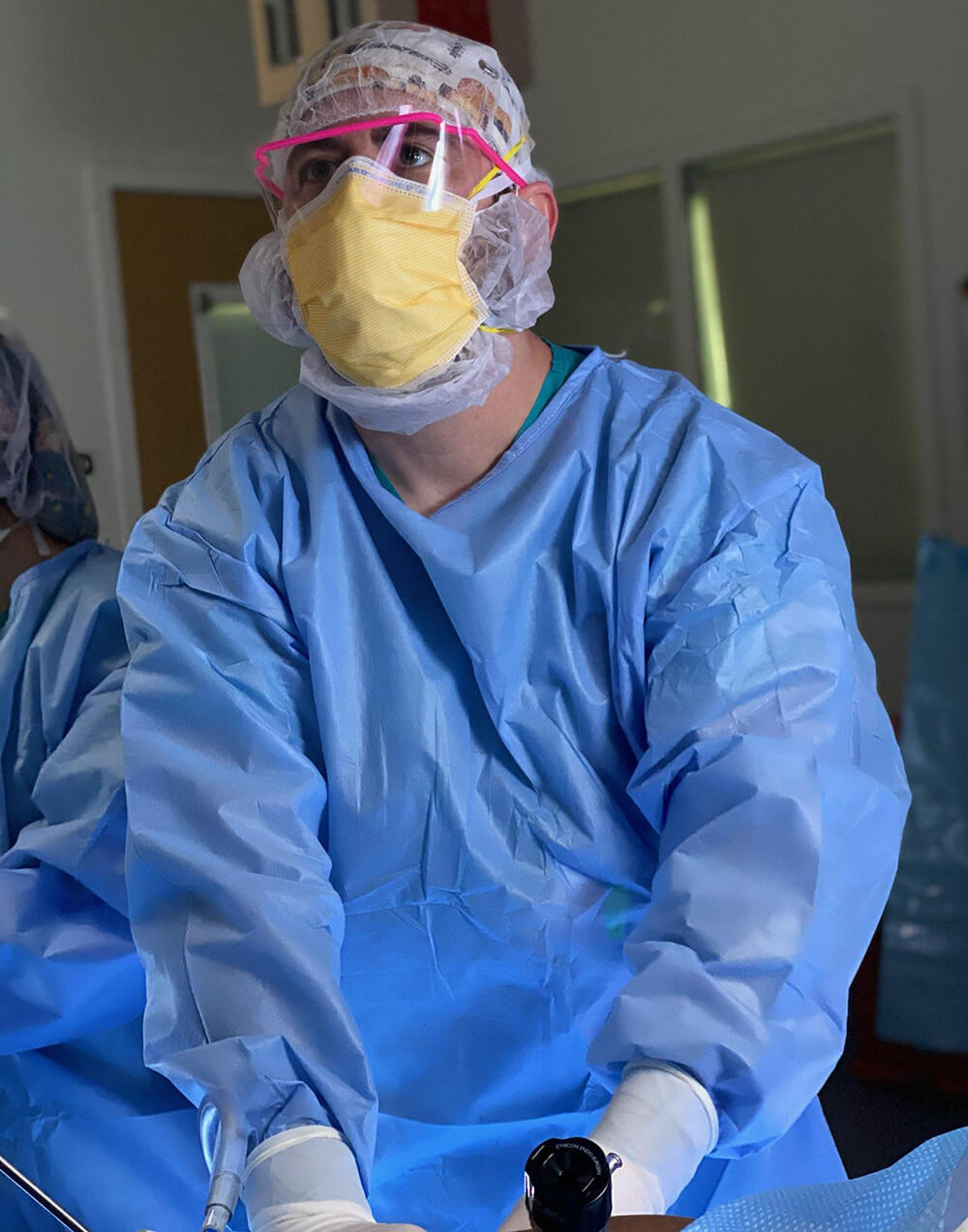The Real Story: Inside a COVID-19 ICU
Touro Alum Dr. Michael Erickson Shares Harrowing Lessons Learned Treating COVID-19 Patients

The “first wave” may be behind us, but New Yorkers are steeling themselves as the coronavirus resurgence hits. When the pandemic swept NYC in the spring, Dr. Michael Erickson, TouroCOM Harlem ‘15 and Chief General Surgery Resident at St. John’s Episcopal Hospital in Far Rockaway, Queens, had completed a fellowship in surgical critical care/burns and was spending his time doing surgeries. St. John’s was the first hospital in the borough with a positive COVID-19 patient, and was hit hard. Everyone had to adapt, and Dr. Erickson’s duties shifted overnight to caring for coronavirus patients in a sealed COVID-19 ICU. Now the national “DO of the Year” is back in the OR, reflecting on the experience and lessons learned as infections rise again.
What was the greatest challenge during the pandemic and how did you deal with it?
Keeping up to date with the most valid data while being overwhelmed by the sheer volume of patients. Playing catch-up while people are dying in front of you. Determining the standard of care on the fly; trying what you know, and hoping something worked. We just had no idea what was going on, and we were trying everything. It was like throwing spaghetti at the wall to see what would stick while the house was on fire. Infectious disease protocols changed daily yet we weren’t seeing much improvement with patients and didn’t have time to see a change either because they were so sick.
We started learning more about this disease the more we saw it. That was very invigorating in a sense, [since] very rarely do you have a new disease to figure out. One of the hardest things for a physician to feel is helpless. What’s the next step when it’s not spelled out in a book and there’s no good data? Nowhere is this more evident than with physicians who normally do not do critical care medicine or intubate people for ventilation.
Having trained in forensics before medical school, we decided to look at autopsy results from Wuhan and other COVID-19 patients around the world to investigate their presumable cause of death, in order to help develop answers and treatments. To know where we were going, we needed to know where we had gone. In the end, everyone had to jump out of their comfort zones to create some sort of positive outcome. No job was too big or too small; from patient hygiene to preparing those who had passed, for the morgue.
What did you learn from treating COVID-19 patients?
How difficult it is when you cannot be close to your family member when they’re sick. The emotional stress is not reserved for the patient and this is not talked about enough. We tried to adapt by having video conferencing when family couldn’t be at the bedside. Out of all the things I learned outside of the science… the real story is the emotional impact of being separated from someone you love who is battling for their life. Our patients were the sickest in the hospital. There were patients we knew weren’t going to do well and when death seemed imminent we made every effort to make sure the family could have interaction with them. It was a big component of our treatment plan.
How had your previous experiences prepared you for being a physician during the pandemic?
My DO training at Touro helped in understanding the impact of COVID-19 – that the disease is systemic; it affects the whole body, not just the lungs. The DO training motivates you to look at the person as a system so you understand the virus is also a clotting, heart and mental or emotional disease – with PTSD. It’s all-encompassing.
What are your thoughts about the U.S. and the rest of the world managing the virus?
We have to take care of each other and maintain good hand hygiene and keep social distancing. It’s flu season, and the flu and coronavirus are spread the same way! Make sure if you’re sick to stay out of public areas. These are common sense things that help prevent COVID-19 as well as the flu. Who knows how effective the flu vaccine will be, and if we have flu + COVID-19, it will be totally devastating to the health care system. Everyone has cabin fever but we have to think about other people – grandparents, siblings and friends.
What advice would you give people entering health care in the era of a pandemic?
People entering the field now are faced with uncertainty. I’d say find a way to stay motivated. Make sure you keep top of mind the reason you’re doing what you’re doing. Your patients, your family – they need you to take care of yourself first. Education is changing because of the pandemic. Understand how to interact with patients, and be flexible. It’s a time for discovery and innovation and we have to stay curious to become better at what we do. To have progress we have to be adaptable and incorporate technology into what we’re doing but not let it be at the expense of the quality of our work or at the detriment of human interaction. You shouldn’t compromise care of the patient, ever – even in the name of progress. It’s all about balance.

